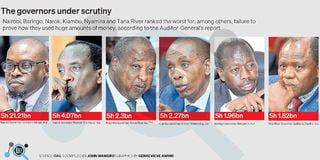
The Auditor-General has queried expenditure of Sh33.6 billion in six counties she ranked as worst performing on management of public finances, shedding light on the mess that could have seen billions of shillings go down the drain, and putting their governors in the spotlight.
The six –Nairobi, Baringo, Narok, Kiambu, Nyamira and Tana River— showed significant issues including failure to prove how they spent billions of shillings in the fiscal year ended June 2023.
There were also variances in different sets of their spending records, payments for services that were never rendered and splurging on salaries while ignoring development.
In her report on county executives for the financial year 2022/23, Auditor-General Nancy Gathungu gave the six counties an “Adverse Opinion”, the second worst score in the management of public funds.
“The financial statements exhibit significant misstatement with the underlying accounting records. There are significant disagreements between the financial statements and the underlying books of accounts and/or standards,” states the report. While the amounts queried do not necessarily mean that the public funds were lost, they point to a high possibility of loss, corruption and breach of law.
Nairobi
Nairobi City county reported spending Sh100 million to buy vehicles and other transport equipment in its financial statements for the year ended June 2023.
However, upon reviewing the county’s documents, Ms Gathungu noted that the county paid over Sh770 million to various motor vehicle dealers during the year.
“However, the amount differs from amounts paid to various motor vehicle dealers during the year of Sh771,589,099. The resulting variance of Sh671,589,099 was not explained. Further, the procurement documents and supporting payment vouchers together with the log books for motor vehicles were not provided for audit review,” Ms Gathungu queried.
She said Johnson Sakaja’s government used a revenue management system ‘Nairobi Pay’ without a contract with the operator.
This is despite the importance of the system, which handles all the county’s cash streams and holds all data on crucial matters such as land details, customer records, unpaid debts and all matters revenue.
“However, no records were provided for review to show how the Management engaged the vendor and the terms of service delivery which exposed the county executive to possible information confidentiality breach, integrity and availability of the system for service delivery,” the Auditor-General noted.
“In particular, the county did not have a valid contract with the vendor nor did they have any service level agreement (SLA) defining the terms of support of the revenue system.”
She queried tens of transactions the county made in the review period that left at least Sh21.2 billion spent in question.
Other queries include the existence of more vehicles (649) than drivers (325), failure to deduct taxes from 393 employees, awarding bursaries to private school pupils and a Sh13 billion variance on pending bills settled during the year, based on different sets of records.
The report notes that the county’s Integrated Personnel and Payment Data (IPPD) on salaries paid to the county staff for the year differs from total payments traced to the salaries bank statements by Sh1.39 billion.
“Further, the amount of compensation of employees’ expense for the year totalling Sh11,185,475,652 differs with the total payments traced to the salaries bank statement amount of Sh9,793,541,055 resulting in an unreconciled variance of Sh1,391,934,597,” the report notes.
While all six counties were given an adverse opinion, in terms of amounts queried, Nairobi accounts for close to two-thirds (63 percent).
Narok
In Narok county, which has the second highest queried amounts of Sh4 billion, among key issues was Sh1.1 billion the county reported as amounts it owes suppliers, but could not provide documents to support the bills, including local purchase/service orders, ageing analysis, delivery notes, inspection and acceptance certificates.
The Auditor-General also queried the use of Sh813.8 million on the purchase of different goods and services, including legal fees and travel that could not be supported to prove that such expenses were incurred.
“The expenditure includes legal fees, insurance expenses and domestic travel and subsistence allowance of Sh520,227,462, Sh30,510,000 and Sh193,804,166 all totalling Sh744,541,628,” Ms Gathungu noted.
“However, supporting documents including legal fee notes, insurance policy documents, invoices and work tickets were not provided for audit.”
Governor Patrick Ntutu’s county also paid 459 employees house allowances in excess of Sh12.9 million, could not provide proof of Sh59.6 million reportedly spent on vehicle purchases and failed to support the spending of Sh99.7 million on acquisition of assets.
Baringo
In Baringo County, of the 36 staff –including chief officers, advisors and staff in Governor Benjamin Cheboi and his deputy’s office- hired during the year, 35 were from the dominant ethnic community in the county, pointing to the proliferation of ethnicity under the county government.
The audit which queries at least Sh1.9 billion used in Baringo county in 2022/23, flags instances of irregular procurements, unauthorised expenditures, spending of millions of shillings that the county could not provide evidence of and awarding of contracts to persons who charged expensive rates.
It also faults expenditures totalling Sh445.2 million on the construction of roads, where the county failed to provide details of how the money was used, even as governor Cheboi spent 41 percent (Sh3 billion) of the revenues collected to pay salaries alone.
“The county paid a Co-operative Society an amount of Sh7 million which is a private entity. The purpose of the payment was not disclosed and no returns for the expenditure were provided to confirm the lawfulness of the activities for which the funds had been applied,” the report notes.
Baringo could also not support more than half a billion shillings reportedly spent on insurance and fuel, and could have lost Sh12 million purportedly used on bursaries for poor students.
“The amount includes scholarships and other educational benefits amounting to Sh42,154,400. However, the expenditure differs with the reported receipts in the Baringo County Bursary Fund of Sh30,154,400 resulting in an unreconciled and unexplained variance of Sh12 million.”
Kiambu
With a queried amount of Sh2.27 billion, among the main issues flagged by the Auditor-General in Kiambu county was a Sh48.7 million payment for coffee fertiliser and chicks that were never delivered. The county paid for 60,000 chicks, but 37,500 were never delivered.
The audit also reveals that some 756 officers were paid a total of Sh29.9 million in excess of leave allowance, the county had procurement irregularities in purchases totalling Sh194.7 million and could not support travel expenses and payments of salary arrears, totalling Sh141 million.
Governor Kimani Wamatangi’s county also scored poorly on development spending, putting a mere 11 percent of its total expenditure on development projects, against the legally stipulated 30 percent threshold.
This was as governor Wamatangi spent 61 percent of the revenues he got (Sh7.8 billion) paying county employees’ salaries and hired 18 of the 22 staff during the year from a single community.
“Analysis of the Kiambu pay system users revealed that the system was configured to use personal email addresses for official communication within the system,” the Auditor-General noted.
“The use of personal email addresses contravenes the directive given by the Head of Public Service and exposes the county government to data leakage and misuse by disgruntled employees for their gain. Further, the county government does not have control over information and data held in the personal emails even in the event the employee exits the county.”
Nyamira
In Nyamira, while the county reported transferring Sh5.4 billion from the County Revenue Fund (CRF) to the county executive and county assembly accounts, auditors’ review of bank statements revealed that Sh6 billion was removed from the CRF, leading to a Sh651 million variance.
The county had also reported spending of Sh197.9 million on domestic travel, but a review of the expenditures revealed that Sh406 million was spent “resulting in an unexplained and unreconciled variance of Sh208,460,153.”
Governor Amos Nyaribo’s county could not back the Sh122 million used on scholarships and other educational benefits, spent in excess of Sh436 million on the county assembly and had weaknesses in its internal controls.
“Review, of human resource records and payroll revealed that the county of Nyamira had one staff whose date of birth was indicated as 11 January, 1960. However, a review of the payroll for October, 2023 revealed that her date of birth was changed to 7 January 1965,” the report, which queries Sh2.3 billion in Nyamira notes.
“Management indicated and explained that there was a mix-up of dates in her documents which was not supported by documents including national identity card, birth certificates and academic certificates. In the circumstances, the effectiveness of internal controls on payroll management could not be confirmed.”
The county spent 46 percent of its revenues on wage bills.
Tana River
Tana River had multiple cases of huge expenditures that the county could not produce documents to support, including Sh475 million in legal costs and a Sh100 million domestic travel bill.
The county also recorded cases where it paid contractors to construct roads, but roads valued at about Sh22 million were never done, resulting in a loss of value.
Governor Dhadho Ghodhana’s government also reported spending Sh1.7 billion on salaries but “supporting IPPD schedules submitted for audit revealed that only Sh1.6 billion was paid through the IPPD system resulting in an unexplained variance of Sh126,704,971.”
In total, expenditures valued at least Sh33.6 billion have been queried relating to issues ranging from procurement irregularities, the counties’ failure or refusal to provide documents thus leaving no proof that the money was used as reported, instances of overpayments, and payments for work not done/goods not delivered.
“The problems are widespread, persistent and require considerable interventions by the Management to rectify,” the Auditor-General notes.








